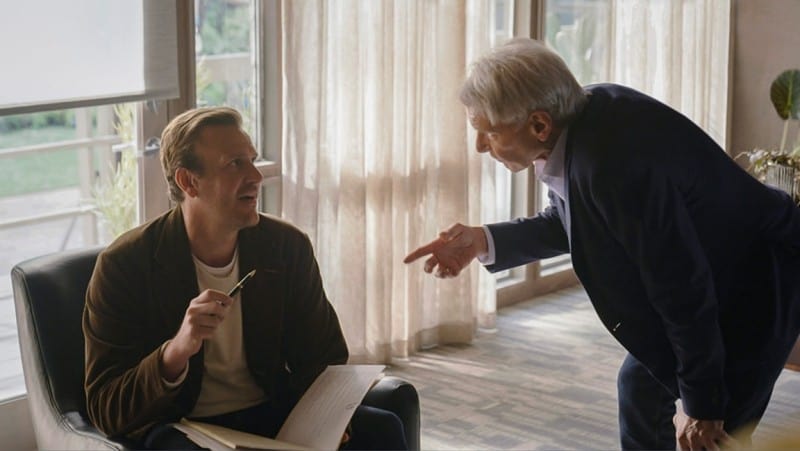Harrison Ford, a Hollywood veteran, and A-list movie star, had never starred in a TV show until just a few months ago. Ford made his small-screen major role debut in the Yellowstone spin-off 1923 before continuing the trend this month with the Apple TV+ comedy Shrinking. While it’s great to see Ford grace our television screens, he’s very nearly the only good thing about Shrinking, an off-putting comedy-drama that strikes all the wrong chords.
On paper, Shrinking has everything going for it. For one thing, the show comes from Bill Lawrence and Brett Goldstein, two of the comedic minds behind Apple’s massive hit series Ted Lasso. For another, the show’s third co-creator and star is How I Met Your Mother and Forgetting Sarah Marshall favorite Jason Segel, pretty much always a welcome addition to any cast. Along with Segel and Ford, the show’s ensemble includes comedian Jessica Williams, Cougar Town alum Christa Miller, and Ugly Betty star Michael Urie, a watch-worthy sitcom roster if ever there was one.
And yet, nearly every part of Shrinking grates. The show is ostensibly about a therapist (Segel’s Jimmy) who decides to take an unorthodox approach to patient care after the death of his wife, but it rarely bothers to drop in on Jimmy’s patients at all. Instead, it becomes a disorganized yet cyclical mess of self-destruction and course correction. Many of the series’ attempts at building pathos center on Jimmy’s daughter, teenager Alice (Lukita Maxwell). While Maxwell is talented and Alice interesting, the show gets caught in a loop of mistaking Jimmy’s constant apologizing to Alice – and occasionally vice versa – for something resembling character growth.
Grief is meant to be the throughline of the series, and it’s the driving force that motivates Jimmy to throw his social and professional rulebook in the trash. But if the show actually wants us to believe Jimmy’s new approach to therapy is capable of doing anything besides getting his license revoked, it’s not making a convincing case. Its attitude towards outside-the-box therapy seems at once juvenile and uninformed, as when he gets an angry patient, played by Luke Tennie, to go boxing (which seems like a pretty basic, non-controversial thing a therapist could do).
There’s probably a bigger picture that the writer’s room is headed toward here, but in the nine episodes available for review, the show’s take on therapeutic practice is far from clear. What is clear is that Jimmy, who comes across as an oddly manic and openly selfish man, often doesn’t give a shit about his patients, rendering the show’s whole premise moot. The narrative loses all shape when Jimmy’s patients become an afterthought while his own stubborn non-growth constantly takes center stage.
Oddly, Jimmy isn’t the only person who flutters through the show seeming as if he’s on uppers. Several characters are prone to emotional outbursts, stream-of-consciousness ramblings, cutting remarks, and moments of social obliviousness. Characters in this show don’t just talk: they all say something, then self-consciously walk back the statement, then say something even worse. The more the show wears on, the less narrative structure it has. Eventually, it’s pretty much just a bunch of semi-random adults hanging out with Alice, giving her conflicting advice about growing up episode after episode.
Ford, as mentioned, is one bright spot in the series. Williams is another. As Gaby, Jimmy’s colleague and his late wife’s best friend, the actress is effortlessly hilarious, able to handle the funny-mean-apologetic dialogue sandwiches that make up much of the script. Each line delivery is better than the last, and her character’s wackiness feels more cool than unhinged. When she shares screen time with Ford, whose character Phil is a therapist navigating his own tricky familial relationships, Shrinking starts to feel like a different, much better show. Ford lets the bravado of his most famous performances go here in favor of a softer, funnier role that still manages to be plenty charming.
At some points, when Shrinking fully stops trying to be about anything and lets its weird comedy loose, it starts to resemble not Ted Lasso but another great Lawrence show, Cougar Town. Miller’s presence as a casually mean but secretly ride-or-die neighbor – similar to her role on that series – certainly helps cultivate the comparison. A few shining moments break through the show’s mostly off-putting exterior, especially when the tone levels out, turning from coked-out to just kind of kooky. When the disparate ensemble gets comfortable, the show starts to feel like a fun, shaggy hangout series a la Cougar Town, but it’s a rare and sporadic feeling.
Like its protagonist, Shrinking is mostly an exhausting hot mess, but it does prove two undeniably good things: Jessica Williams can do anything, and Harrison Ford is as great a TV star as he is a film star.
Shrinking debuts on Apple TV+ on January 27, 2023. Watch the series trailer here.

